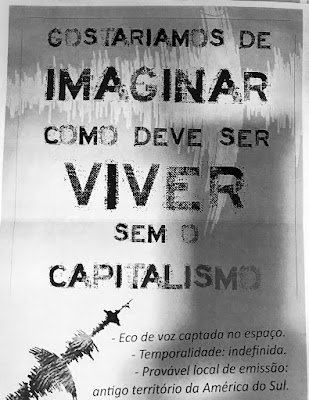Notas para a vida no LIMIAR (2022), photo by Sérgio Fernandes.
I'm trying to wrap my head around two phrases from EdC's Utopia da Memória (2019).
The first is "o futuro morto bem atrás." How can the future lie behind us (rather than ahead of us)? One of the things that make UdM so striking is that it's permeated with such instances of temporal disorientation. From our perspective, the future is by definition that which hasn't come yet; so how can it already be dead and behind us?
Mark Fisher (via Franco "Bifo" Berardi) is helpful here, inviting us to think of "o futuro" not as a direction but as the refusal of what Fisher termed "capitalist realism," according to which "there is no alternative" to the catastrophe that is (neoliberal) capitalism. In other words, "o futuro" is the (sometimes faltering) conviction that there has to be alternatives to this cruel and unjust present. If we accept the "realistic" perspective of "capitalist realism" -- "reality is the way it is" and will inevitably continue to be "the way it is," so "there is no use in fighting" (the "neoliberal fatalism" that Paulo Freire fiercely denounced) -- then the future is dead behind us even though we keep moving forward in the direction of something that can only be an incresingly catastrophic version of the present.
It's this "cancelamento do futuro" (as EdC puts it alluding to Berardi and Fisher) that we desperately need to reverse. Or, to stay with the image of UdM, what we need to do is restore a dead future to life. (Here it's impossible not to think of Fisher's writings on "hauntology;" the future may be dead behind us, but doesn't its spectre haunt us today?)
The other phrase is "saudade do que deveria ter sido." This is another instance of disorientation. We typically think of "saudade" as a longing for something or someone that was and no longer is. In this sense, we may feel "saudade" of a future that once lived and now is dead. "Saudade" thus may be how we relate to this dead future; we long for it (even, or particularly those of us who have been born under "capitalist realism"), which is why it haunts us and why we refuse not to try to restore it to life.
But how does one feel "saudade" of something that never was, something (in the past) that should have been but wasn't? For instance, UdM seems saturated with a "saudade" of Canudos. The "mundo utópico" of Canudos was after much resistance eventually destroyed by government forces, but what if it hadn't been? What other futures could this past have opened up to? Is this what Fisher means by "lost futures"? Is "saudade do que deveria ter sido" our deep longing for such "lost futures"? Like "o futuro," do these "lost futures" lie dead behind us?
"Saudade do que deveria" -- and thus poderia -- "ter sido" is a way of relating to pasts and their "lost futures," and of relating to our own moment as haunted both by the spectres of "lost futures" and of "the future" itself, the very conviction that what we call "the present" is open to non-catastrophic, non-capitalist futures that are never lost in advance. Our "saudade" of "lost futures," and of the loss of the future we sometimes seem to accept as irreversible, may be key to the task of restoring the future to life.
The "Revolução Popular" of 2118-19, which is mentioned in UdM and haunts the future of 2062 in Notas para a vida no LIMIAR, may be understood as an act of restoring the future to life (rather than of predicting that a particular event will take place at a particular point in time) by announcing (in the Freirean sense of the term) a not-yet lost future in which capitalism has been overthrown, a future we can feel "saudade" of in the sense of a fierce longing for what poderá ser.

